Hyundai Bayon VS Kia Niro
Hyundai Bayon
The Hyundai Bayon is a compact crossover that effortlessly merges practicality with modern design. Its sleek exterior and spacious interior make it an ideal choice for urban settings and longer journeys alike. With a focus on comfort and connectivity, this vehicle provides a smooth driving experience paired with advanced technology features.
detailsKia Niro
The Kia Niro presents itself as a versatile and eco-friendly SUV, blending a stylish design with advanced hybrid technology. Its spacious interior offers comfort and practicality, making it ideal for both city driving and longer journeys. With a focus on efficiency and sustainability, the Niro is a compelling choice for environmentally conscious drivers.
details @ hyundai.news
@ hyundai.news
 @ hyundai.news
@ hyundai.news
 @ hyundai.news
@ hyundai.news
 @ hyundai.news
@ hyundai.news
 @ hyundai.news
@ hyundai.news
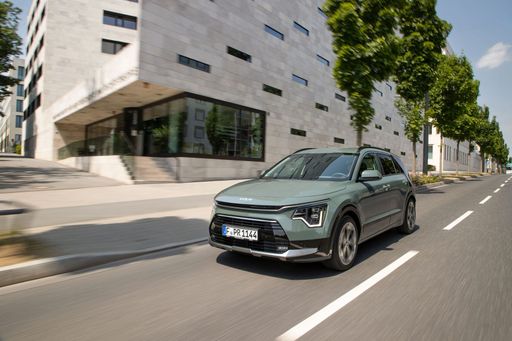 @ press.kia.com
@ press.kia.com
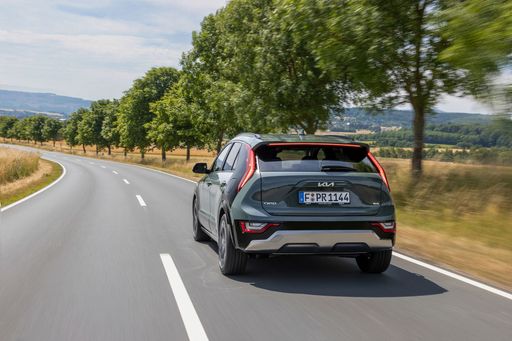 @ press.kia.com
@ press.kia.com
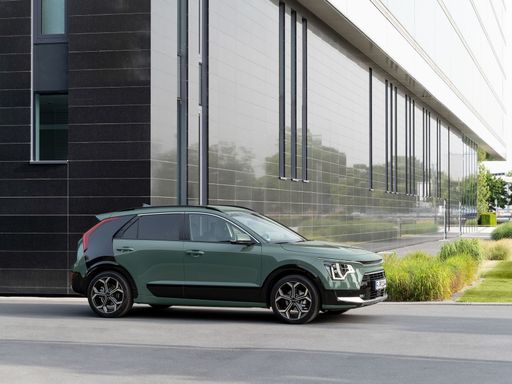 @ press.kia.com
@ press.kia.com
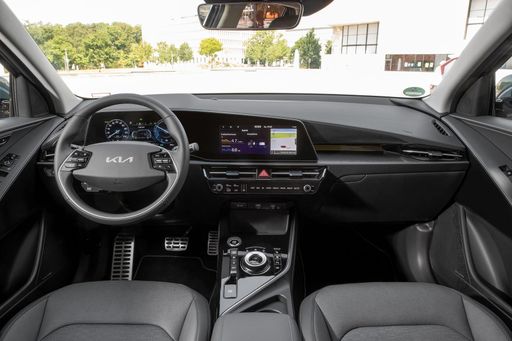 @ press.kia.com
@ press.kia.com
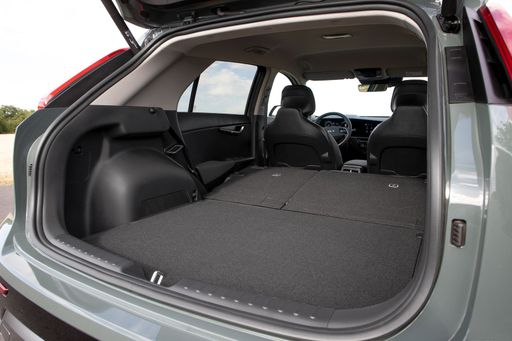 @ press.kia.com
@ press.kia.com

|

|
|
|
|
Costs and Consumption |
|
|---|---|
|
Price
about 21200 - 27400
$
|
Price
about 30300 - 40800
$
|
|
Consumption L/100km
5.4
L
|
Consumption L/100km
0.8 - 4.4
L
|
|
Consumption kWh/100km
-
|
Consumption kWh/100km
-
|
|
Electric Range
-
|
Electric Range
65
km
|
|
Battery Capacity
-
|
Battery Capacity
1.3 - 11.1
kWh
|
|
co2
122
g/km
|
co2
19 - 100
g/km
|
|
Fuel tank capacity
40
L
|
Fuel tank capacity
37 - 42
L
|
Dimensions and Body |
|
|
Body Type
SUV
|
Body Type
SUV
|
|
Seats
5
|
Seats
5
|
|
Doors
5
|
Doors
5
|
|
Curb weight
1170 - 1195
kg
|
Curb weight
1474 - 1594
kg
|
|
Trunk capacity
411
L
|
Trunk capacity
348 - 451
L
|
|
Length
4180
mm
|
Length
4420
mm
|
|
Width
1775
mm
|
Width
1825
mm
|
|
Height
1500
mm
|
Height
1545
mm
|
|
Payload
460 - 465
kg
|
Payload
466
kg
|
Engine and Performance |
|
|
Engine Type
Petrol
|
Engine Type
Full Hybrid, Plugin Hybrid
|
|
Transmission
Manuel, Automatic
|
Transmission
Automatic
|
|
Transmission Detail
Manual Gearbox, Automat. Schaltgetriebe (Doppelkupplung)
|
Transmission Detail
Automat. Schaltgetriebe (Doppelkupplung)
|
|
Drive Type
Front-Wheel Drive
|
Drive Type
Front-Wheel Drive
|
|
Power HP
100
HP
|
Power HP
129 - 171
HP
|
|
Acceleration 0-100km/h
11.3 - 12.4
s
|
Acceleration 0-100km/h
10.4 - 11.3
s
|
|
Max Speed
176 - 179
km/h
|
Max Speed
160 - 161
km/h
|
|
Torque
172 - 200
Nm
|
Torque
265
Nm
|
|
Number of Cylinders
3
|
Number of Cylinders
4
|
|
Power kW
74
kW
|
Power kW
95 - 126
kW
|
|
Engine capacity
998
cm3
|
Engine capacity
1580
cm3
|
|
Top speed
176 - 179
km/h
|
Top speed
160 - 161
km/h
|
General |
|
|
Model Year
2024
|
Model Year
2024
|
|
CO2 Efficiency Class
D
|
CO2 Efficiency Class
C, B
|
|
Brand
Hyundai
|
Brand
Kia
|
Hyundai Bayon
Introducing the Hyundai Bayon: A New Era in Compact SUVs
The Hyundai Bayon, a compact SUV designed with urban adventurers in mind, is making waves with its exceptional blend of style, performance, and technology. The brand has pulled out all the stops to ensure that the Bayon stands out in the crowded SUV market, offering a vehicle that is both practical and innovative.
Sleek Design and Cutting-Edge Aerodynamics
The Bayon features a striking exterior design, characterised by its bold lines and angular shapes. With a length of 4180 mm, a width of 1775 mm, and a height of 1500 mm, the Bayon commands attention with its modern appeal and aerodynamic efficiency. These dimensions not only contribute to its sleek design but also enhance fuel efficiency, achieving an impressive 5.4 L/100 km.
Engine Performance and Specifications
Under the bonnet, the Bayon is powered by a 1.0-litre T-GDI petrol engine, delivering a robust 100 PS or 74 kW. This engine is available with either a manual or automatic gearbox, meeting varied driver preferences. The front-wheel-drive system complements its urban-centric design, ensuring a smooth and responsive ride.
Maximised Interior Space and Comfort
The spacious interior of the Bayon accommodates up to five passengers comfortably. The vehicle boasts a boot space of 411 litres, perfect for both everyday use and weekend getaways. The cabin is designed with practicality and technology in mind, with intuitive controls and ample storage options.
Advanced Technology and Connectivity
Hyundai has equipped the Bayon with state-of-the-art technology to enhance the driving experience. The SUV features a high-resolution touchscreen, offering seamless connectivity with Apple CarPlay and Android Auto. Safety is also a priority, with multiple driver assistance systems including lane-keeping assist and forward collision avoidance assist.
Environmental Efficiency
Despite its powerful performance, the Bayon achieves a respectable CO2 efficiency class of D, with emissions as low as 122 g/km. This balance between performance and environmental responsibility makes the Bayon an attractive option for conscientious drivers.
Affordability and Market Appeal
The Hyundai Bayon is competitively priced, ranging from €22,900 to €29,600. Its affordable running costs, estimated at 32.3 to 36.4 cents per kilometre, further enhance its appeal to budget-conscious consumers. With monthly costs ranging from €806 to €909, the Bayon provides excellent value without compromising on features or performance.
Final Thoughts
The Hyundai Bayon truly stands out in the compact SUV segment, combining style, innovation, and practicality in an appealing package. It offers a versatile driving experience suited to the demands of modern urban living, making it a top contender in its class. As Hyundai continues to champion forward-thinking design and technology, the Bayon is a testament to the company's ongoing commitment to excellence.
Kia Niro
The Evolution of the Kia Niro: A Glimpse into the Future
The Kia Niro has become a symbol of innovation in the hybrid and electric vehicle market. This compact SUV offers a unique blend of efficiency, performance, and style, appealing to a wide range of drivers. Kia Niro's latest model lineup showcases different powertrains, offering consumers choices between full hybrid, plug-in hybrid, and full electric options. These advancements represent Kia's commitment to sustainable mobility and cutting-edge technology.
Performance and Efficiency: Behind the Wheel of the Kia Niro
The performance range of the Kia Niro is impressive, with power outputs ranging from 129 PS in the full hybrid variant to 204 PS in the completely electric version. This ensures that there’s a Niro to meet diverse driving needs and preferences. The acceleration from 0-100 km/h spans between 7.8 to 11.3 seconds across different models, showcasing a balance between efficiency and responsiveness.
Fuel and energy consumption figures are equally commendable. With the hybrid models consuming between 0.8 to 4.4 litres per 100 km and the electric model utilising 16.2 kWh per 100 km, the Kia Niro caters to eco-conscious consumers. Notably, the plug-in hybrid version offers a remarkable electric range of up to 65 km, while the fully electric model boasts an impressive range of 460 km on a single charge.
Innovative Features for Today’s Driver
Kia has equipped the Niro with state-of-the-art features aimed at enhancing the driving experience. The latest models come with advanced driver assistance systems, ensuring safety and convenience. These include lane-keeping assist, adaptive cruise control, and collision avoidance technologies that set a high standard in the compact SUV class.
The Niro also benefits from a sleek infotainment system featuring a high-resolution display, offering seamless connectivity with features like Apple CarPlay and Android Auto. This keeps drivers connected while minimising distractions, creating an optimal driving environment.
Design and Practicality: A Perfect Balance
The Kia Niro stands out with its aerodynamic design, which is both aesthetically pleasing and practical. The dimensions of the vehicle – 4420 mm in length, 1825 mm in width, and a height ranging from 1545 to 1570 mm – provide ample space for passengers and cargo. The boot capacity ranges from 348 to 475 litres, catering to those who require versatility for their lifestyle or family needs.
The Niro’s cabin is crafted with a focus on comfort and usability, incorporating high-quality materials and an intelligent layout that complements its sophisticated exterior.
Sustainability and Cost Efficiency
The Kia Niro reflects Kia's dedication to improving environmental performance. The CO2 emissions spectrum, ranging from 0 to 100 g/km depending on the powertrain, highlights the vehicle's eco-friendly credentials. For those particularly conscious of their environmental footprint, the electric and plug-in hybrid models offer substantial reductions in emissions.
In terms of cost, the Niro offers competitive pricing from €32,790 to €47,590, and operational costs ranging from €928 to €1,101 per month. The Niro also maintains a reasonable cost per kilometre, between 37.1 to 44.1 cents, making it an economically sound choice in the long run.
Conclusion: The Future is Bright for Kia Niro
The Kia Niro stands as a testament to Kia’s innovative spirit and commitment to providing eco-friendly and technologically advanced vehicles. Its blend of performance, efficiency, and innovative features make it a compelling option for those seeking a future-focused SUV. As Kia continues to evolve, the Niro remains a leading example of how the brand is shaping the future of driving.
